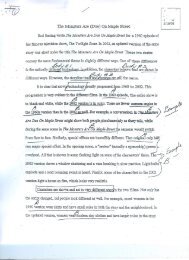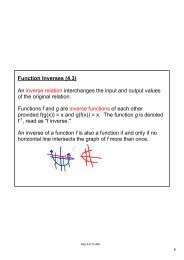Rosencrantz and Guildenstern Are Dead - Cherokee County Schools
Rosencrantz and Guildenstern Are Dead - Cherokee County Schools
Rosencrantz and Guildenstern Are Dead - Cherokee County Schools
You also want an ePaper? Increase the reach of your titles
YUMPU automatically turns print PDFs into web optimized ePapers that Google loves.
But in the midst of this social <strong>and</strong> political turmoil, <strong>Rosencrantz</strong> <strong>and</strong> <strong>Guildenstern</strong> <strong>Are</strong> <strong>Dead</strong> displays no<br />
interest in the social <strong>and</strong> political issues of its time. And for many years after his initial success, Stoppard<br />
seemed to write from a steadfastly apolitical point of view, claiming, perhaps puckishly, that "I must stop<br />
compromising my plays with this whiff of social application. They must be entirely untouched by any<br />
suspicion of usefulness. I should have the courage of my lack of convictions."<br />
As a result, the work following <strong>Rosencrantz</strong> <strong>and</strong> <strong>Guildenstern</strong> <strong>Are</strong> <strong>Dead</strong>—including such plays as The Real<br />
Inspector Hound (1968), Jumpers (1972), <strong>and</strong> Travesties (1974)—seemed to a number of critics to lack<br />
political <strong>and</strong> social awareness. Stoppard's drama was seen by many as dazzling in its display of ingenuity <strong>and</strong><br />
word play <strong>and</strong> interesting in its often arcane subject matters but ultimately superficial. Influential British<br />
theatre critic Kenneth Tynan summed up this assessment succinctly, calling Stoppard "a cool, apolitical<br />
stylist," referring to Travesties as "a triple-decker bus that isn't going anywhere."<br />
But in a flurry of plays in the late 1970s, starting with Every Good Boy Deserves Favor (1977), Stoppard<br />
silenced these critics by writing several plays dealing explicitly with political issues <strong>and</strong> themes. Every Good<br />
Boy Deserves Favor is set in a Russian prison hospital where one of the inmates is imprisoned for his political<br />
beliefs. Professional Foul (1977) is set in Czechoslovakia <strong>and</strong> deals with political dissidents in a totalitarian<br />
society. Night <strong>and</strong> Day (1978) takes place in a fictionalized African country <strong>and</strong> examines the role of the press<br />
in a dictatorial third-world country while Cahoot's Macbeth (1979) concerns the repression of theatre in<br />
Czechoslovakia. Though not considered major plays in the Stoppard canon, these works clearly demonstrated<br />
Stoppard's capacity for engaging contemporary social <strong>and</strong> political issues.<br />
The Tradition of the Theatre of the Absurd<br />
When <strong>Rosencrantz</strong> <strong>and</strong> <strong>Guildenstern</strong> <strong>Are</strong> <strong>Dead</strong> appeared in 1966, its possible connections to the Theatre of<br />
the Absurd were seen immediately, in part because of Stoppard's conscious echoing of Beckett's classic<br />
Waiting for Godot. But subsequent assessments have suggested that Stoppard's connection with this literary<br />
context is more problematical than initial identifications would have suggested.<br />
The Theatre of the Absurd arose after World War II <strong>and</strong> flourished in the 1950s <strong>and</strong> early 1960s, initially <strong>and</strong><br />
especially in France in the works of Eugene Ionesco (E-on-S'-co), Jean Genet (Shuh-nay'), <strong>and</strong> Samuel<br />
Beckett. These <strong>and</strong> other playwrights rejected the concept of a rational <strong>and</strong> ordered universe <strong>and</strong> tended to see<br />
human life as absurd <strong>and</strong> lacking purpose. To express this vision effectively, these dramatists tended to<br />
eliminate reassuring dramatic elements like logical plot development, realistic characterization, <strong>and</strong> rational<br />
dialogue, replacing them with bizarre qualities that forced audiences to experience absurdity first h<strong>and</strong>.<br />
And in 1968, Stoppard acknowledged the impact that Beckett <strong>and</strong> others had had on writers of his generation,<br />
saying "it seemed clear to us, that is to say the people who began writing about the same time that I did, about<br />
1960, that you could do a lot more in the theatre than had been previously demonstrated. Waiting for<br />
Godot—there's just no telling what sort of effect it had on our society, who wrote because of it, or wrote in a<br />
different way because of it."<br />
By the mid-1960s, the Theatre of the Absurd had lost much of its shock value <strong>and</strong> was already becoming<br />
outmoded, taking its last flourish in America from the early work of Edward Albee. But in 1966 <strong>and</strong> 1967,<br />
many critics saw Stoppard as a late example of this absurdist movement, with Charles Marowitz asserting in<br />
May of 1967 that Stoppard's play eventually became "a blinding metaphor about the absurdity of life."<br />
However, later assessments have suggested that Stoppard uses the Theatre of the Absurd more for comic<br />
effects than philosophical meaning. Critics like William Gruber eventually observed that <strong>Rosencrantz</strong> <strong>and</strong><br />
<strong>Guildenstern</strong> are given the opportunity for meaningful action (when they discover the letter condemning<br />
Hamlet) <strong>and</strong> lack the courage or character to act responsibly. And in Beyond Absurdity: The Plays of Tom<br />
Stoppard (1979), Victor Cahn makes the case that "<strong>Rosencrantz</strong> <strong>and</strong> <strong>Guildenstern</strong> <strong>Are</strong> <strong>Dead</strong> is a significant<br />
Historical Context 8
















